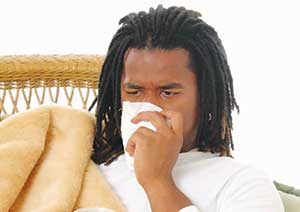Harmattan season is here. And just like any other, there are common ailments associated with the season. Women’s Editor, TEMITOPE OJO, writes on how to ensure protection against the harsh weather.
 Every season of the year comes with its health challenge, which affects people’s lives. In this part of the world, malaria, cold, flu, food infection, water infection, cholera and other infections usually spread when the rains come. Harmattan, which occurs during dry season also comes with certain common ailments.
Every season of the year comes with its health challenge, which affects people’s lives. In this part of the world, malaria, cold, flu, food infection, water infection, cholera and other infections usually spread when the rains come. Harmattan, which occurs during dry season also comes with certain common ailments.
The dry season is a yearly period of low rainfall in the tropics and is usually characterised by strong wind, which blows south-west from the Sahara desert into the Gulf of Guinea between October and March.
Dry weather condition has various health implications to humans and animals, especially affecting the skin, eyes and respiratory system. However, the negative effects of harmattan season seem to outweigh its benefits on human lives, especially those that live in the northern part of Africa.
Doctors advise people to protect their bodies against various communicable diseases that go with harmattan. As a result, the weather appears harsh to the hair and skin.
Medical Director, Solid Rock Hospital, Ojodu, Lagos, Dr. John Aromeh, said the harmattan season comes with pneumonia, asthma, nasal congestion and other health complications that dust induces.
According to Aromeh, people with asthmatic health condition or other upper respiratory diseases are the ones that are mostly affected during this season.
“Harmattan affects people with certain health conditions; it even affects people whose health is normal. But asthmatic patients are among those that are seriously affected by this season.
“One of the trigger agents in asthma is dust. So during the season, we all know that the wind is dry and it brings a lot of dust, which means that people who are suffering from asthma have recurrent and more frequent attacks during this particular period,” he said warning that people should wear warm clothing to minimise the likelihood of contracting these communicable diseases.
Aromeh also said that the skin should be well protected against the effect of harmattan, which could do huge damage to the body.
“The wind is dry and it picks up a lot of particles from the environment, which will not only affect people with asthma, but also normal people and their eyes. And if you are not the type that baths two or three times in a day to wash those particles off your eyes, you stand the danger of having conjunctivitis and other related infections,” he stated.
“It is also safer sometimes to wear sunglasses to protect the eyes, where the winds are quite dusty and harsh.”
He also advised people to always keep away from dusty environment to guard against possible ailment.
“People should ensure that their windows are closed always, to avoid dust which can trigger asthma and sickle cell disorder.
“Due to the dusty atmosphere, there is need to imbibe healthy food preservation culture, especially hawkers of food such as fruits, to prevent food-borne diseases.
“Fruits and vegetables should be properly washed before eating. Our drinking water containers should also be properly covered,” he said.
Public health officer, Dewale Owodunni, also advised Nigerians to take more liquid, especially water, to prevent dehydration and heatstroke. He also cautioned against drinking of water from unsafe sources.
“People tend to get water from any source. They expose themselves to greater chances of contracting upper respiratory tract infections and water-borne diseases such as diarrhoea and cholera.
“People should be mindful of their sources of water supply. If in doubt, please boil and allow to cool before drinking,’’ the expert advised.
Despite all these negative effects, studies have shown that the harmattan season is not without its health benefits to people. The low temperature associated with it is unfavourable for mosquitoes to breed, thus reducing the incidence of malaria fever.













